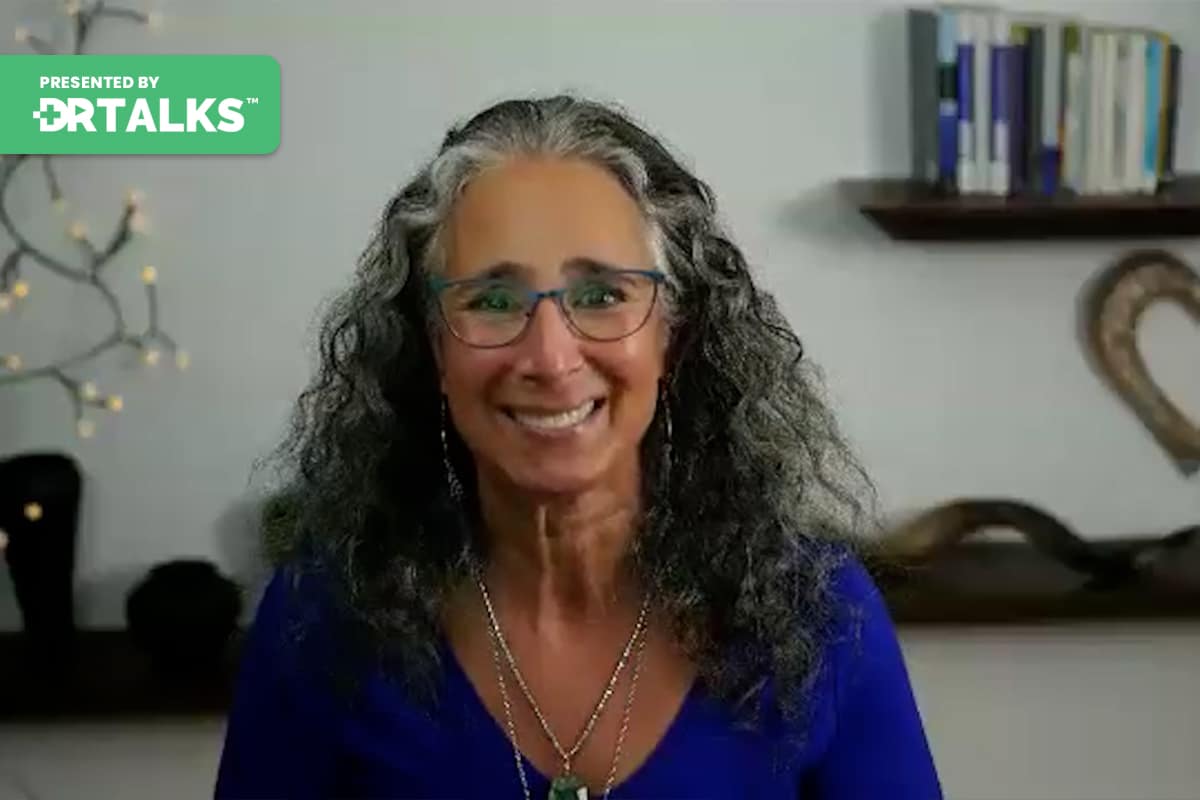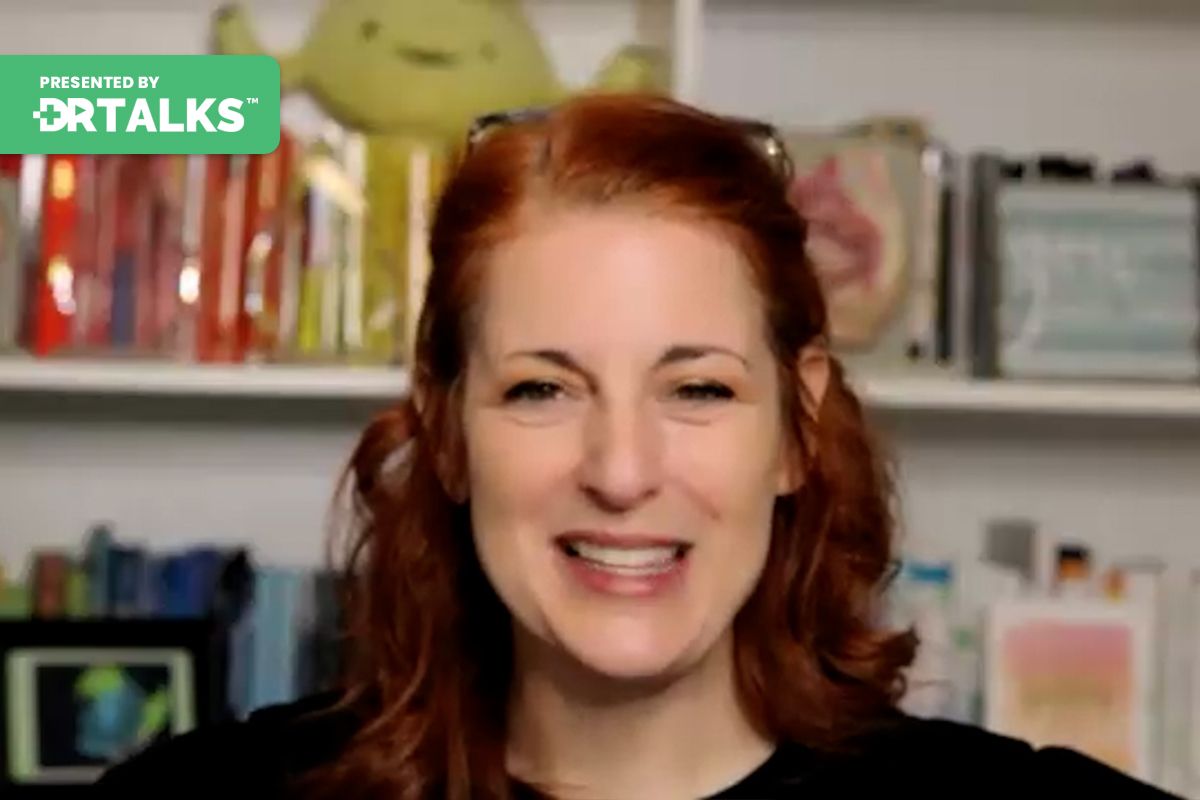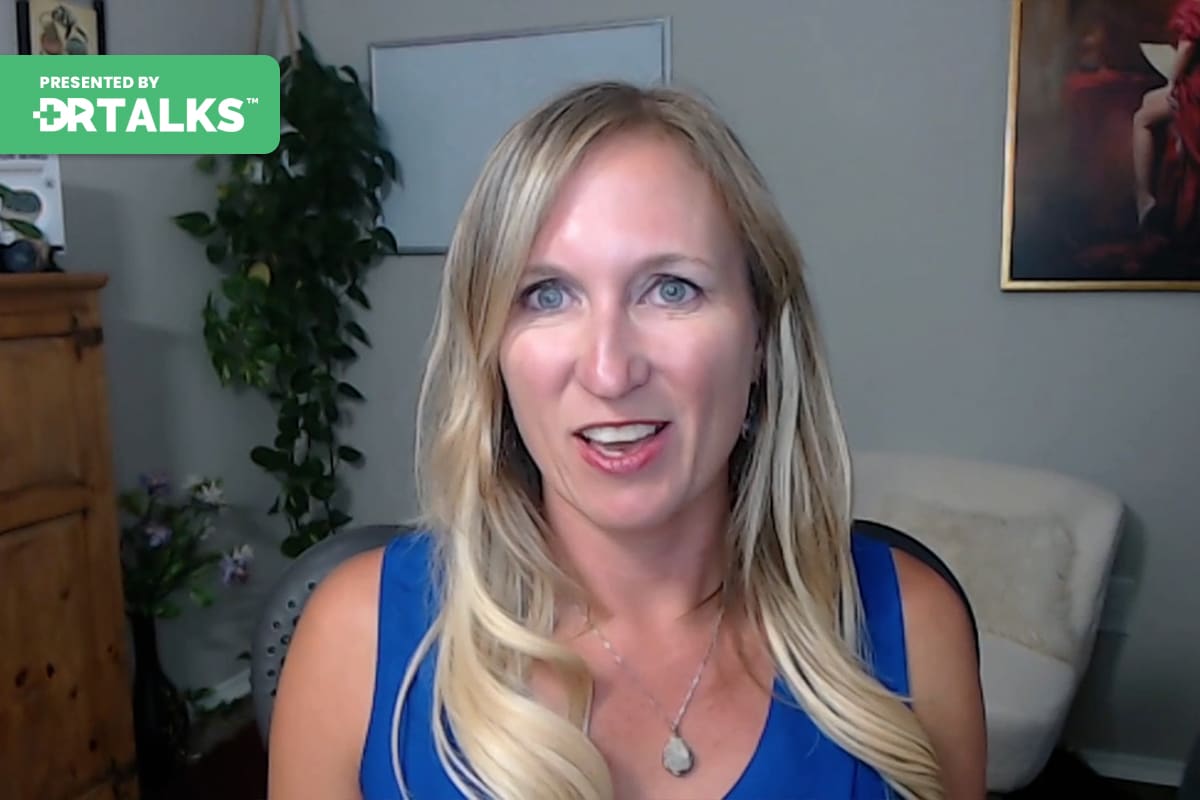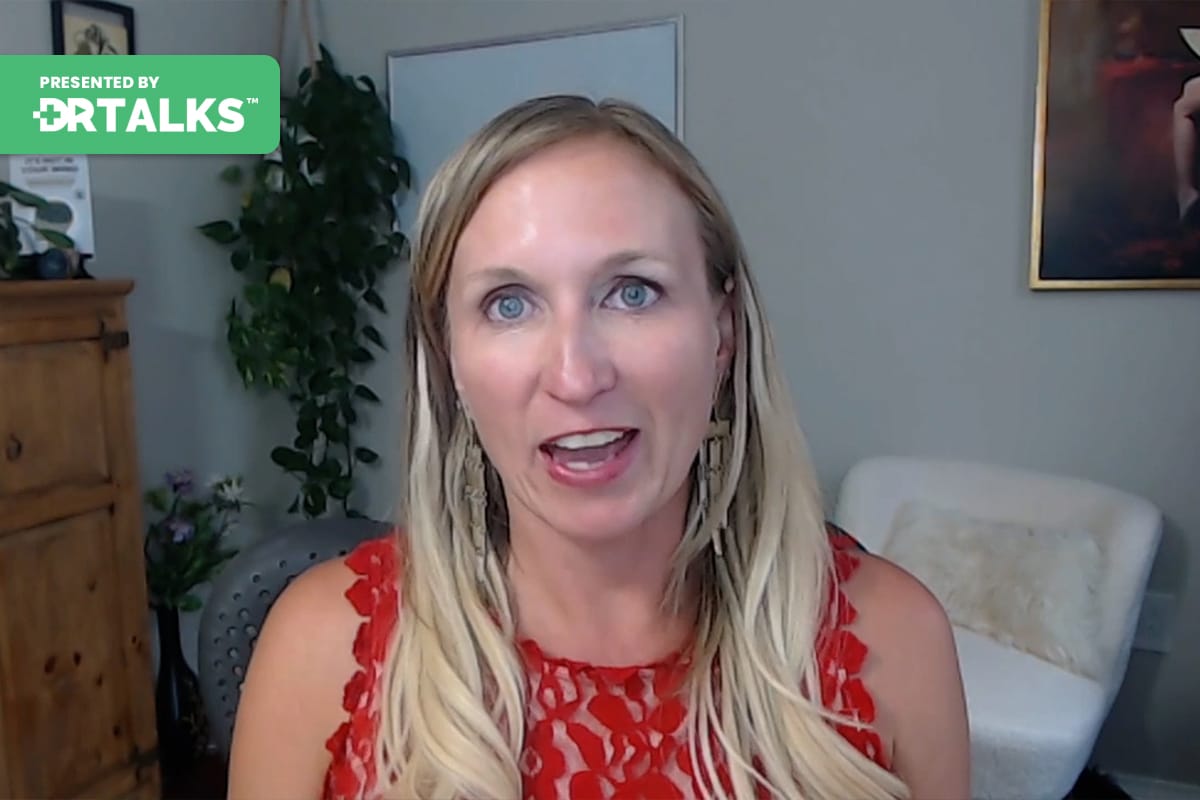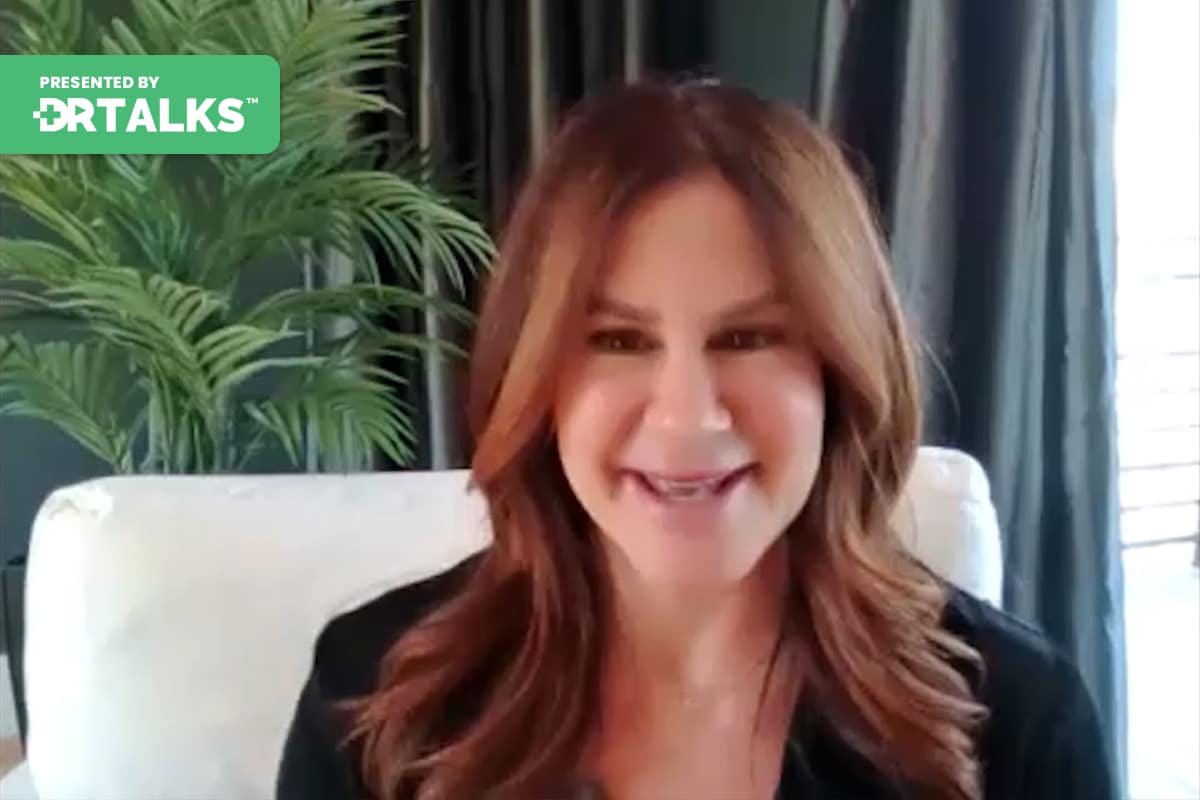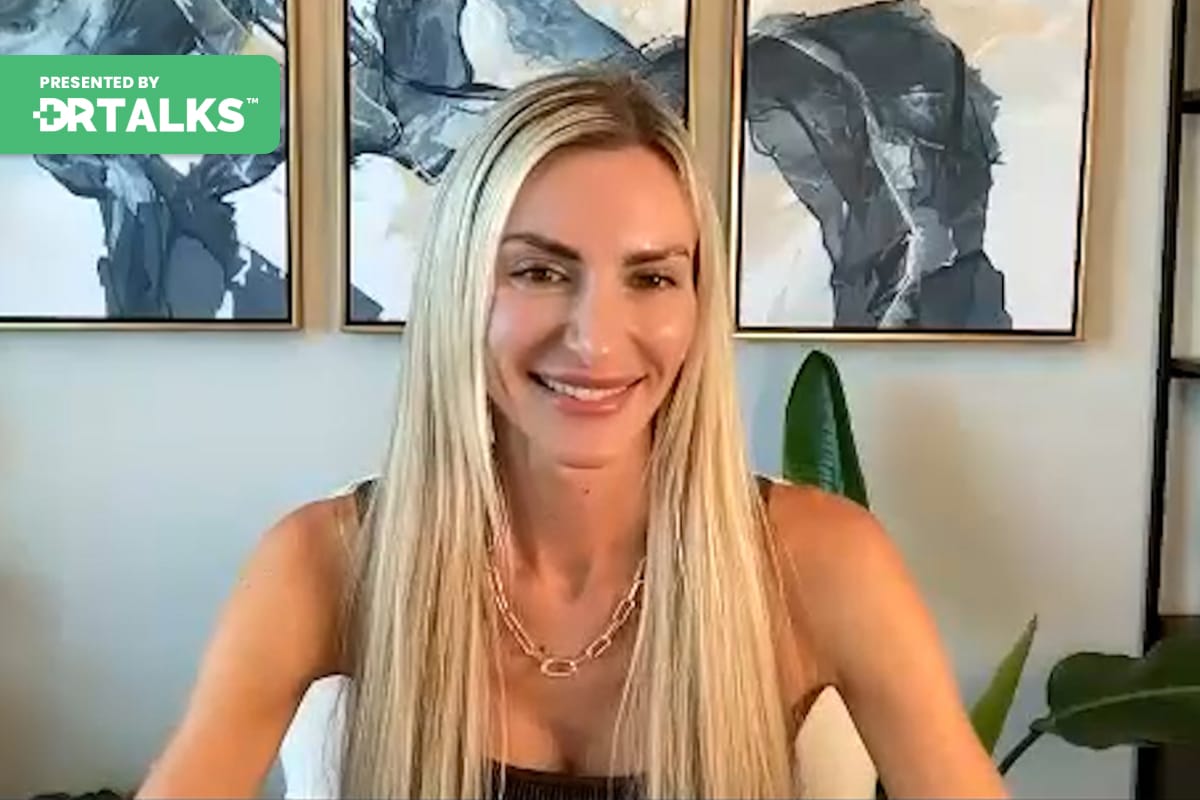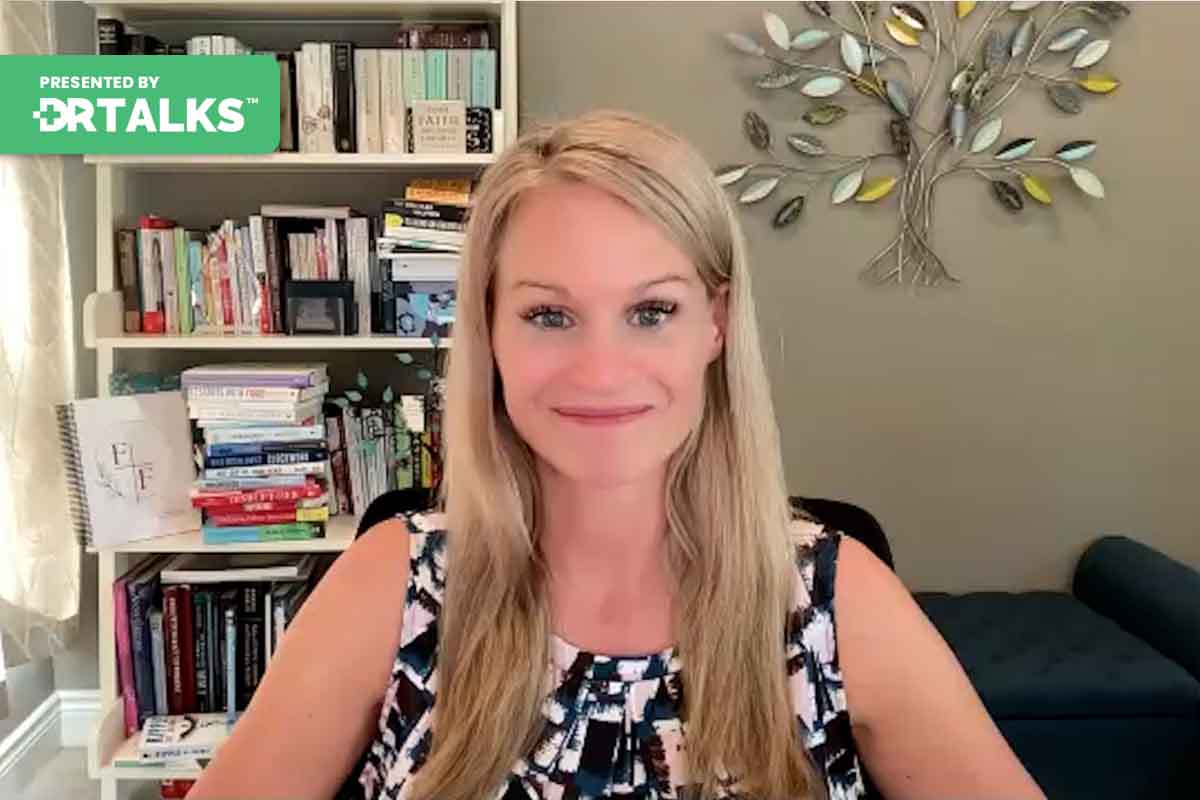Join the discussion below

Betsy Greenleaf, DO, FACOOG (Distinguished)
Betsy Greenleaf, DO, FACOOG (Distinguished). Premier women’s health expert, entrepreneur, inventor, and business leader, who specializes in female pelvic medicine and reconstructive surgery for over 20 years, Dr. Greenleaf, is a trailblazer as the first female in the United States to become board certified in Urogynecology. She possesses a professional... Read More

Dr. Sarah Salzman is a Leading Couples Psychologist and the Founder & CEO of the Couples Communication Institute, which is dedicated to helping couples achieve lasting closeness and intimacy through effective communication. For over 35 years she’s helped couples get closer and more connected by strengthening their communication. She’s known... Read More
- Understand the significance of open communication and setting the stage for intimacy
- Dive into the art of understanding oneself before conveying desires to a partner
- Learn the importance of mutual communication to ensure both partners feel valued
- This video is part of the Solving Sexual Dysfunction Summit
Related Topics
Communication, Emotional Health, Intimacy, Mental Health, Relationships, Sexual Health, StressBetsy Greenleaf, DO, FACOOG (Distinguished)
All right, everybody, welcome back to the Solving Sexual Dysfunction Summit. I’m very excited. We have with us Dr. Sarah Salzman. She is the founder and CEO of the Couples Communication Institute. We’re going to be talking about discussing desire and the foreplay of couples’ communication. Thank you so much, sir, Dr. Sarah, for being with us.
Sarah Salzman, PhD
It’s a pleasure to be here, Betsy.
Betsy Greenleaf, DO, FACOOG (Distinguished)
It’s one of those things that, as a urogynecologist, I get into the functionality of parts and hormones and this and that. But there is so much more when we’re talking about couples, relationships, and sexual stress that can happen. I guess, backing it up a little bit, how did you come to form the Couples Communication Institute?
Sarah Salzman, PhD
I have been a couples psychologist for 35 years now, and while I was able to help with the number of couples I could see at once, I realized I wanted to reach so many more couples. I formed the Online Couples Communication Institute so I could share all the great stuff that I have learned with couples everywhere.
Betsy Greenleaf, DO, FACOOG (Distinguished)
That is wonderful. Getting into this sexual dysfunction is more like sexual stress and relationships. What are the things that you see that commonly happen with couples?
Sarah Salzman, PhD
Well, when you’re calling, it’s actual stress. That stress word is the central part of it. Whether it is sexuality or any connection with your partner, when you feel safe, virtually the whole world is your oyster. When you feel safe, you can connect, you can communicate, and you can be intimate. But stress, in a certain way, is synonymous with fight or flight. When our body starts heading into fight or flight, when we’re in fight or flight, well, we’re stressed. When we’re worried, when we’re concerned, or when we’re anxious, the person in front of us starts to look at our nervous system like our enemy, and the whole cascade of that fight or flight, the emotional response,, and everything that goes with it, blocks us and shuts us down. That is the underlying thing that I see everywhere.
Betsy Greenleaf, DO, FACOOG (Distinguished)
How can we avoid that in our relationships? Because it can be something little that triggers you to start having, like, that miscommunication, and then that can turn into a big fight. How do we stop that, to begin with?
Sarah Salzman, PhD
I’m going to share with you a couple of things. Stop it to begin with, and stop it when it starts to get going. Like you just said, you start feeling that miscommunication. The first thing that I want to share with you is when you’re planning, and I hope you do plan when you’re planning to talk with your partner to be intimate with your partner. When you plan ahead of time, that opens a door for you to relax before you get started. Just an extra word about planning. I know spontaneity feels, like, exciting. Maybe we’re supposed to be spontaneous when it comes to sex. But the more you can plan, the more you set things up for success. Ahead of time, if you want to talk with your partner, let your partner know, Hey, I want to talk with you about something. How about we do that in 20 minutes? How about we do that at brunch on Saturday? If you want to have sex or just play around, say, “Hey, let’s do that after dinner.” Then, beforehand, focus on your body. Take some time to relax your body and your mind. Do your favorite thing to relax. Whether it’s deep breathing, baths, or meditating, anything that works for you will relax your body and your mind. That’s how to get things ready ahead of time. Now, let’s suppose, like you said, Betsy, how do you catch things if they’re headed off in the wrong direction? It’s related to the first thing that I was saying. What you want to have is awareness. You want to be able to connect your awareness with your state of either relaxation, fight, or flight. Let’s say you and I are talking, Betsy, and I’m feeling fine. Like, now, I’m feeling fine. I’m feeling good. I’m seeing you again, Betsy. It’s lovely. It’s great. I miss you. But then something shifts, and I’m not understanding you, or I’m feeling misunderstood, or something. Do I recognize my friends doing this? Or, like, I’m feeling tight or whatever that good feeling was I was just describing a moment ago. It seems to be starting to fade. This is power in your hands when you can recognize—wait a minute—that easy, open, happy, relaxed feeling. I had. It’s shifting. What happened? The more I can tune in to that, then I can bring you in. On it, I can say, “Hey, Betsy, just a second, and give me a second. I don’t know how to put it in words. I’m not sure what to say, but something’s off. Give me a minute.” Or maybe I do know. then I need to relax myself. “Hey, Betsy, give me a second. I need to take a couple of deep breaths because I’m feeling a little tense, and I’m not sure where that came from.” Or maybe I do know where it came from. Then, if I take a minute or two and calm back down, then I’m whatever I want to say, reconnecting with my own relaxation. That’s my long answer to that question.
Betsy Greenleaf, DO, FACOOG (Distinguished)
I love that. then maybe think about how many couples I’ve heard that come in and expect their whole lives to be like when they first started dating. when it comes to sex and they’re like they just expect, or like the movies where they’re just all of a sudden sitting on the couch one minute, next thing they know, they’re all over each other. But we know that as time goes on, that’s not it; it’s not like the movie is. How do we bring that up with partners when we’re like when one partner’s maybe a little out of sync with the other partner when it comes to desire?
Sarah Salzman, PhD
Okay. I heard you say, How do we bring that up, and how? Like if we’re out of sync. What I want to talk about is: how do we bring up whatever the thing is. There is something that doesn’t feel right to me. There is something I want to talk with you about, whether it’s being out of sync or anything else. I’m not sure how to bring it up. The first thing you’re going to do is think through it in your mind. You’re going to get clear. There is something I want to bring up with my partner. What is it? Put your finger on it. Put your finger on the one thing that you want to talk to your partner about. Maybe it’s out of sync with becoming intimate, or maybe it’s out of sync with the time of day that works best for us, or whatever it is. Pick one thing, and then you’re going to identify it by how you feel about it. Are you annoyed? Are you worried? Are you angry? Whatever it is, then you’re going to think about what you want to come out of a conversation about it. Do you want to vent? Do you want support? Do you want to solve problems? Do you want to be heard? What is it that you want to come out of this? You’re going to put all that aside for a minute. Next, you’re going to think about something that you appreciate about your partner that’s related to this in some way. if it’s talking like I appreciate the great conversations that we’ve had before or how we can get on the same page, and I’m going to think about some detail as to when this has happened before. All of that I’m thinking about now, and I’m going to ask myself, When is a good time and where is a good place for the two of us to talk about it? This is my work, which I’m doing all by myself. The next thing I’m going to do is not talk to you about it, but set up a conversation for us to talk. Before I share those steps with you, I want to share them with your audience. Betsy, this is no surprise. Betsy and I did not spontaneously get on this Zoom call. Betsy said to me, A couple of months ago, a month ago, Hey, Sarah, can you come to my summit? I said yes. She said, When is a good play time for you? Here’s my calendar under it: Pick a time. I picked a time. Now, Betsy and I both arrived ready today at the top of the hour to have this conversation, knowing full well that we had agreed to it and knew what we were doing. I told Betsy, Here are some things I can talk about. Betsy said, Hey, Sarah, I want to talk with you about these things. We’re on the same page, and we set this up quite a while ago and put it on our calendars. Here’s what I want you to do next. You’ve thought about it in your head. The first step is to get your partner’s attention. You’re not going to go like this. Hey, honey, can we talk? No, please don’t do that.
Betsy Greenleaf, DO, FACOOG (Distinguished)
I know I’ve been there.
Sarah Salzman, PhD
You’ve been in there on both sides. Yes. Yes, you’re going to get up, and you’re going to walk into the room where your partner is. You’re going to look at them, and you’re going to see: are they busy or are they concentrating? If it looks like they’re available to be interrupted, I’m going to tell you why this is so important. The second, if it looks like they are available to be interrupted, you’re going to say very gently, you’re going to say their name, hey, Betsy, and you’re going to wait for your partner. Maybe it’s Betsy’s turn to look up and say, Yes, honey, or Yes, Sarah. Now, this is so important because remember, at the very beginning, how I told you that safety is the foundation of all good connections. If I walk in the room and I say, Hey, Betsy, and you’re like, Oh, you just got this shot of adrenaline through your body, and you’re like, No matter what happens next, it’s not going to go, Well, I’ve startled you. I’ve interrupted you already. It’s not. Okay, so I come in and look. Oh, Betsy. It looks like I can say something. Hey, Betsy. Betsy says yes. Then I say, Do you have a second? Betsy feels seen. She might say yes. Now I’m going to start with my appreciation. I’m going to say, Betsy, there is something I want to talk about. I appreciate how we can have good conversations. Remember that time last week when we talked? It went so well. Then I’m going to bring up those other things that I had prepared. I’m going to let my partner know—what is that one thing I want to talk about? How do I feel about it, and what’s my goal? I need your support, or I want to get on the same page, or I’d like you to hear me, and then I’m going to ask: When is a good time and place for us to have this conversation? I was thinking, How about during brunch on Saturday after the kids go to bed, or whatever? I’m going to see what you say, and we are going to schedule it on our calendar unless we say, How about 20 minutes? Maybe we don’t put it on the calendar. But if it’s important enough, put it on your calendar. All this time, we’ve talked about two things. You’re prepared in your mind, and now you’ve set it up with your partner. They know what’s on the table. what’s on the table. I’m going to go on to the next part, but do you have any questions or anything before I keep going?
Betsy Greenleaf, DO, FACOOG (Distinguished)
No, I was just thinking, like, I’ve talked to you about this stuff before, and I have to say it works. I’ve tried it with my husband, but there are some times when I just want to, like, spurt everything out of my mind, and I don’t want to wait. But I will say, Sarah, you’re so right. It works so much better when we schedule that, when we’re all on the same page, as much as sometimes it can be difficult not to do just that.
Sarah Salzman, PhD
Let’s see when I see you go like this, bleh! I don’t feel very calm when I start, and you say I want to spurt it out. I want to go inside. I’m like, “Let’s cut me. What is she going to say? Oh, no, I’m worried.” That’s not how you want me to feel. Or, if I’m your partner, you don’t want me to feel that way. You want me to feel open and ready. I get it. There is something in my mind, and I just want to say it. Of course, I do. But when I am the leader and I take control and I relax and I prepare myself, look how well I’m setting the stage, and how inviting is that? Especially if I want to talk about sex with you or with my partner. My partner wants to feel like, oh, I feel safe with her. I feel in good hands with her. This is going to go well. I don’t have to worry.
Betsy Greenleaf, DO, FACOOG (Distinguished)
Yes, that’s such a great point.
Sarah Salzman, PhD
So just to answer the question that you brought up, I might say the one that focuses, “Hey, I want to talk with you, honey, about what did you say, Betsy?” Like, we’re out of sync with how we initiate sex or something like that.
Betsy Greenleaf, DO, FACOOG (Distinguished)
Yes, .
Sarah Salzman, PhD
So that’s the topic. I can say what I want to do. My goal is to hear how you like to initiate sex or how you want to talk about sex. I want you to hear how I do it.
Betsy Greenleaf, DO, FACOOG (Distinguished)
That is so helpful. Then you were saying that there was a third part that we should hear.
Sarah Salzman, PhD
This is something that I teach. It takes a long time to teach all of it. I can’t teach all the parts of it now. But I just want to highlight that even though I said, what’s the goal? It is our goal to solve the problem, so what I want you to do is understand. The first goal of your conversations should be understanding. The first goal should not be to problem solve, make a decision, convince them, debate, or make a point, but to understand each other. I need to understand your point of view, and I would like you to understand my point of view. That means not being defensive, not feeling like if I understand you, I have to agree with you; understanding doesn’t mean agreeing. But if you say to me, for example, I just think spontaneity is the most important thing I want to say. Tell me more about that. What about spontaneity? Do you value what it means to be a spontaneous person? What does it mean to you? Whatever it is, I want to understand more. Tell me more. How does it feel when you’ve been spontaneous? How did it feel when you didn’t have that opportunity? Whatever. Just ask me questions. I’m beginning to paint a picture so I can see what your view is like in your head, and when I’m doing this, you’re going to feel understood, probably seen, heard, and understood. My turn is that of the speaker. I want to share with you how I see it. I just made this up. I’m pretending you want to be spontaneous. I want to plan. I want to say that I like planning things ahead of time because, and I’m going to share with you some of the reasons, this is how I feel and this is what it lets me do. This is what happens when I don’t get to plan. I want you to hear me. I don’t want you to talk me out of it. I don’t want you to feel threatened. I want to be like, Oh, that makes sense. I get it. Knowing you, that sure fits in with a lot of other things I know about you. I remember this one time when we planned and how well that went. Yes, I get it now.
Betsy Greenleaf, DO, FACOOG (Distinguished)
If you set that date with your partner to talk, then that date comes. Maybe it is sometimes because people are busy, and now you get to that period and you’ve decided the topic. But let’s say you like, let’s say me like, I’m like, all ready to talk about the topic. But my partner doesn’t have anything to talk about. Is this where it seemed like when the examples you were giving were given? This is like when we start asking a lot of questions and try to get them more engaged in the conversation. Is that correct?
Sarah Salzman, PhD
You’re saying, What if your partner has nothing to say?
Betsy Greenleaf, DO, FACOOG (Distinguished)
Yes, whatever. They’re like you’re wasting your concerns, and they’re just like, okay, that sounds good. It doesn’t have much. The feedback was part of the conversation.
Sarah Salzman, PhD
Okay. There is feedback. One thing is this: I might want to ask them: Could you repeat back what you heard me say? because they might be saying Aha, sounding good, or whatever. I might have no idea. Did they hear me in their brains, or was it just like that? I always recommend you repeat back what you heard me say and tell me, Is there a part of it that makes sense to you? That’s one thing you brought up as a misunderstanding. This helps to make sure that we’re not misunderstanding each other. No. If I got to speak first and my partner did repeat back and they told me what made sense, I’m going to ask them, How do you see this subject? Let’s say we’re talking about spontaneity versus the planning of sexuality, a conversation, or something like that. What’s your view if your partner truly says, I don’t think any way is fine? Maybe it asks some other questions, like what has worked for you more in the past? Or, if you could have it any way you want it or draw them out, let them know. It’s important to me. I would like to hear what you have to say. Also, maybe reassure them; that I’m not going to shoot you down. I want to hear: I was listening to this podcast with Dr. Betsy and Dr. Sarah, and they talked about how you need to understand before problem-solving. I just want to understand you. Help set things up as safely as possible. that they can open up.
Betsy Greenleaf, DO, FACOOG (Distinguished)
I like that because, when it comes down to it, it’s also just beyond the couple’s communication. This is human communication. We all just want to be seen and heard.
Sarah Salzman, PhD
We do. Just think about what it feels like when your coffee shop barista remembers your order. It’s like they see me, and it’s just this lovely little spark. It’s all the more so when it’s your partner who sees and hears you.
Betsy Greenleaf, DO, FACOOG (Distinguished)
Even just in our example here, when we’re talking, I notice that every time you see my name in the conversation, it’s like this little dopamine hit, like, oh, she said my name, and I like that too, as a little way to interweave that connection with the conversation.
Sarah Salzman, PhD
Hearing your name indeed brings a little bit of intimacy, and it’s even better than hearing your pet’s name. I could say, Yes, honey, I get it. But, Betsy, I get it. I hear what you’re saying. You don’t want to say it 100 times, but yes, it’s just like you’re talking to me and you’re seeing me.
Betsy Greenleaf, DO, FACOOG (Distinguished)
Do you find there anything that’s, and I’m sure you’ve heard and seen so much in your career, but is there anything common, like a common complaint you see with couples that you’re able to help and address in general? Like the most, I would say, probably the most common.
Sarah Salzman, PhD
The most common complaint I ever heard, which is why I founded the Couples Communication Institute, is that we don’t know how to communicate. That is the most common complaint. far and away the most common complaint. But, drilling down a little bit further, I’m not sure how people can put this into words, but if I have a list of things that I’m trying to do in my day and you just come over and start talking, I’m just not ready. It’s a break. It’s a disruption between the two of us if we have kids. I’m trying to make the lunch, make sure they put their shoes on, and get myself ready to go. I have 16 things that have to be done. Then you just come over and start talking to me. I’m like, Are you kidding? Do you see what I’m trying to do? Maybe people just say we can’t communicate. But it’s a lack of connection that’s just so distressing to key into your partner. This is why I said to go into the room and look at them. What are they doing? if I’m frantically getting the lunches in my briefcase, like we don’t have briefcases anymore, getting it all ready to go, and I’m scrambling. Just look at me and realize, “Oh, I bet she doesn’t have bandwidth for whatever’s on the top of my mind now.” I want to feel supported and seen, like, “Oh, honey, I can see how busy you are. First of all, can I give you a hand? Second of all, can we talk after work today? I see you’re busy. Something I want to tell you, Betsy.” is not a thing that goes wrong, but a turn-on when your partner sees, hears, and understands you. When your partner listens to you, notices you, and gets you, I want to spend time with you. You’re the guy who just said, I see you’re busy. Can I help you? I want to talk to you. Do you have time left later? I see you’re busy now. You just got my attention, buddy.
Betsy Greenleaf, DO, FACOOG (Distinguished)
I agree with you because I was just thinking, like, we’re in such a fast-paced world nowadays, and everyone’s going. Going in different directions and just being able to stop and just listen to each other like that is amazing. Is there anything that I didn’t ask you? I know we could probably be sitting here for hours talking about this topic. I know I could. Is there anything that I didn’t ask you that you specifically want us to know?
Sarah Salzman, PhD
Well, one thing that comes to mind is that I want to expand a little bit. I talked briefly about what you appreciate about your partner. If you want to talk with your partner as we do but something’s not quite right, the more that you can connect that with appreciation and the more that you can connect that with what you positively want and with what you enjoy, the better it’s going to go. If I want to talk to you about sex and intimacy and any part of that, if I can start with something like, “Honey, the times when back when we had the closest, most enjoyable sexual connection, those have been amazing times for us. I want to reconnect in that way,” most people are going to be like, You just got my attention, honey, rather than an opening. I don’t know; you never bring up sex in the way, or I need you to stop pestering me. Or I can let them know what you like and want more of. I like you, and I want more time with you. I want this sexual connection we used to have, or whatever we used to have. I feel so close to you when we have that together. As I said, if you can include details like what if there was this one time when we were, I don’t know, at the cabin for the weekend, I can say, “Honey, remember the sex we had at the cabin that weekend?” Hopefully your partner used to be like, “Oh, yes, I want to talk with you about how we can make that happen more often.” Would you like to have a conversation where that’s our goal? talking about appreciation, talking about positive things, talking about the good stuff, the juicy stuff you want more of, then you can, and when you bring that up and you see your partner light up now, you can say, “So what I want to talk about is ways that we can start to connect, ways we can have a conversation about what we want more of or whatever, because some of it doesn’t work so well for me. When can we have that conversation?” But starting with the good that I want more of.
Betsy Greenleaf, DO, FACOOG (Distinguished)
I love this because it’s like it’s a combination of, well, it’s not attacking them the first thing that they’re walking through the door. I like that you were sitting this day, and then we’re also not coming from it to be like, “Hey, I got this problem.” I like how we’re like, “Oh, remember that time.” That’s just what listening to you say made me want to talk about it more too. I’m like, “Oh, I’m getting this.” This is the stuff they needed to teach us. Like, we should have all gotten, like, couples communication, like one-on-one instead of, like, sex education in high school. This would have been so much more useful. This is why, like, what you’re doing is amazing in the world and just helps so many people. I love this.
Sarah Salzman, PhD
That’s because I give a masterclass regularly. That’s why, in the beginning, I said nobody ever taught us. We didn’t learn from our parents. We didn’t learn in school. Like, how do you communicate? I never learned that.
Betsy Greenleaf, DO, FACOOG (Distinguished)
Oh, my goodness, I love this. Now, where can people find out more about you?
Sarah Salzman, PhD
Well, my website is couplescommunicationinstitute.com. There is everything. And can I share my quiz?
Betsy Greenleaf, DO, FACOOG (Distinguished)
Yes, . That would be wonderful.
Sarah Salzman, PhD
Yes. On my home page, I have a quiz. When you take the quiz, you’re going to find out which communication zone you’re in with your partner, whether things are closed, open, or in between. then you’re going to get a guide where you’re going to get everything that I’ve talked about today pretty much and more. For me, that’s the best place for people to start getting to know me and what the Couples Communication Institute has to offer. I also, as I said, give a regular masterclass, and I have, of course, made couples communication easy, but start with the free quiz and you’ll get a guide. This will remind you of pretty much everything that we talked about today.
Betsy Greenleaf, DO, FACOOG (Distinguished)
Oh, I love this. Thank you so much. I’m so grateful that you took the time to talk to us about this because this is so important, and I know it’s going to make a difference. In a lot of people’s lives, I’m already thinking through my head, like when I’m going to go on that date to talk to my husband. I’m going to check back with you on that one because I am like, Ooh, I got a lot of tips and got out of this one. Thank you so much, Dr. Sarah. I appreciate it.
Sarah Salzman, PhD
You are welcome, Betsy. Here are two happy, communicative, connected, and sex things for the world.
Betsy Greenleaf, DO, FACOOG (Distinguished)
Awesome. Everybody, make sure you go check out Dr. Sarah Salzman and stick with us because we have some great sessions coming up.
Downloads

